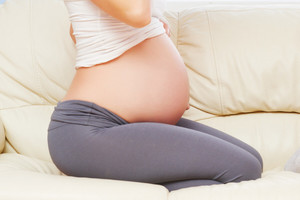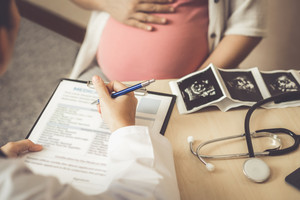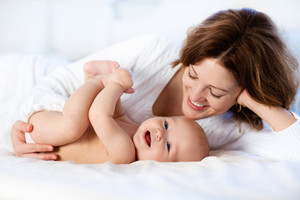
It is now no longer rare for women with cystic fibrosis (CF) to have children. However, pregnancy with CF does have its risks and should therefore be well thought-out and prepared. A mother with CF shares her experience in the PARI blog.
Since I can remember I have been leading a “normal life” despite the fact that I have cystic fibrosis. And I do everything I can to keep it that way – such as doing an inhalation therapy twice a day. When my healthy, younger sister had a child 15 years ago, it was the first time I was confronted with the question of whether I want a child some day. And if so, is that even possible with my sick body? Will my health change because of a pregnancy? And even though I did not have a specific desire to have a child back then, I wanted to know what my options were. Did I have that choice? Could I allow myself to want to have children?

Because I wanted clarity, I just came out with the question to the respiratory specialist I had at the time. And he told me “One child is fine. I would not advise you to have more than that. Every child you have could worsen your lung function and general state of health. Pregnancy is a strain on the body, as is bringing up children. I have four.”
That was when I realised that if I wanted to have a child, I should not wait until I hit 40. The lung function of patients with cystic fibrosis does, after all, tend to worsen and not improve with age. The better the lung function, the better the baseline for a pregnancy.
Four years later I was in a steady relationship and we both wanted a child. By that time I was 35 – so not exactly young. I was working full time plus overtime. My FEV1 was 66 percent – not really perfect, but not awful. I kept myself fit with endurance training. I had my diabetes under control.
To best prepare myself for a potential pregnancy, I had to make preparations. This also included switching my medication: I had already stopped or replaced any medication that could harm a foetus. I also took folic acid, calcium and a few other medications as supplements.
I had to go for check-ups more often to detect any infections early on. This was to prevent me from getting a severe infection which could not be treated properly because of a potential pregnancy. My partner also had tests to check if he carried the gene for CF.

Women with cystic fibrosis are at a certain risk of needing longer to get pregnant – that’s what I was told. This is why I urged my gynaecologist to refer us to a fertility clinic straight away. I did not want to waste precious years and FEV1 scores to end up finding out that it was not going to happen naturally. After six months of trying without success to conceive, he then referred me to a fertility clinic.
When we went to the fertility clinic, that is when it started getting serious. While you do need luck to get pregnant and stay pregnant when you go for IVF, you have to do a lot more than just check your ovulation calendar and mark your fertile days.
This is why I am thinking about one question in particular at the moment: Will I die younger than a healthy mother? Is it fair to expose a child to that risk? To what extent will my chronic illness place a mental strain on the child? Do I want to expose a child to that? I answer these questions with another: What kind of life is worth living? Is a life not worth living if the mother is sick or dies early?
So off we went to the fertility centre and out came the hormone injections, accompanied by constant check-ups, egg collection and then inserting the fertilised eggs.

IVF is a time-consuming and in my case sometimes very painful procedure. Collecting the eggs from the ovaries was painful. It is normally done under general anaesthetic, or at least it was at the fertility centre I visited. To protect my lungs, they did not use anaesthetic on me.
Collecting the eggs was not quite as painful as the giving birth, but it came quite close. I was so weakened by it and my circulation was so depleted that I almost ended up being hospitalised. Fortunately, this was something I managed to avoid. After the eggs were collected, I did have to spend three to four days on the sofa though, to recover. You usually get a sick note for one day afterwards, and then you are fine.
At least my body had produced enough eggs that we had enough “material” for four to five attempts. The first attempt ended in an ectopic pregnancy, which meant I had to have vacuum aspiration and a scrape. The second attempt was unsuccessful. The third time we were lucky! I was pregnant! The foetus’s heart was beating and I returned to the fertility clinic under the care of a gynaecologist.

Aside from one nasty infection I caught in my third trimester (it was winter), I was generally well during my pregnancy. Even the infection did not pose any major complications for me or my child, although I did end up having to have intravenous antibiotics.
By that time I was working freelance and less than 40 hours a week. Being freelance meant I could take my time and take breaks when I wanted. That worked out well. There were a few weeks when I was very tired and I needed a lunchtime nap every day.
I also had more doctor’s appointments than I had had before the pregnancy. I was closely monitored by my gynaecologist, pneumologist and diabetologist – I had to go to one or the other doctor every week or two.
There were also tests such as prenatal diagnostics, which raised another worrying question: What do I do if my child is severely disabled? Should I then have the child and put my body through that if my child will maybe die because of a congenital disease before he or she reaches the age of three? Would I be able to bring up a severely handicapped child when I myself have health hurdles to overcome? What kind of life is worth living? Fortunately, we never had to make any difficult decisions like that.

My pregnancy was without complications or problems – well, almost. Because my child was born five weeks too early. There is a certain risk of premature births in pregnant women with CF. But nobody had expected this to happen in my case. There were no warning signs. One day before my waters broke I even went to the gynaecologist at the obstetric clinic.
So I was badly prepared for the birth. I had not packed any drugs or clothes for the hospital. I had not cooked and frozen any meals for when we came back from hospital. Nothing. Oh well... We still managed somehow. I would still, however, advise pregnant women who have CF to make the following preparations before their due date:
Being pregnant with CF is child’s play compared with being a mother with CF when you have a baby or a toddler. Finding time to regularly do your inhalation therapy, your breathing therapy and maybe also sport is definitely a challenge. Keeping fit and healthy despite having a child is difficult, but important. Sleep deprivation, infections, being controlled by the needs of the child are almost daily occurrences – your life is thrown on its head.
But I have saved the good news for last: By the time your child is four years old, the greatest challenges will be behind you. And from the age of six, it is definitely easier. At least, that’s how it was for me. My child is now nine.
The author would like to remain anonymous.
Note: This is a personal report from the author. PARI does not have any influence over the content of the article.
An article written by the PARI BLOG editorial team.
© 2025 PARI GmbH Spezialisten für effektive Inhalation